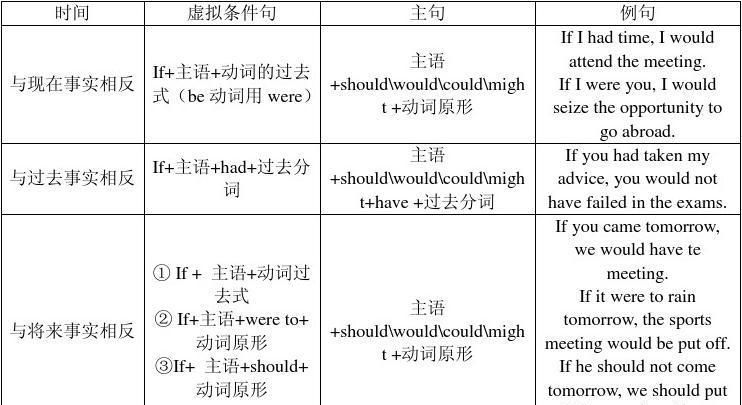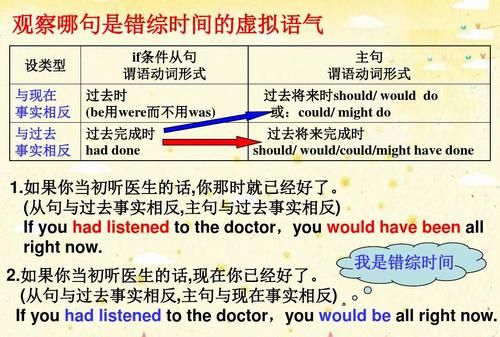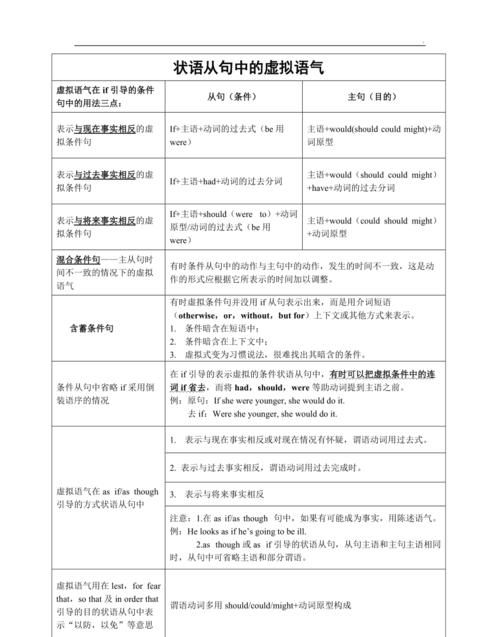本文目录
虚拟语气if的用法归纳ppt
虚拟语气的内容主要有三大模块,第一模块就是涉及到条件从句部分的内容。这一部分的虚拟语气主要体现在三个方面:基本用法,各自为政,以及含蓄之美。
扩展资料
虚拟语气用法有哪些
虚拟语气在条件从句的用法
条件句有两类,一类是真实条件句;一类是非真实条件句,也就是虚拟条件句。
如果假设的情况是有可能发生的,就是真实条件句,谓语要用陈述语气。如 If it doesn’t rain tomorrow, we will go to the park.
如果假设的情况是过去或现在都不存在的,或将来不大可能发生的,则是虚拟条件句。如 If he had seen you yesterday, he would have asked you about it. 在含有虚拟条件句的复合句中,主句和从句的谓语都要用虚拟语气.
错综时间条件句
有时条件从句的动作和主句动作发生的时间不一致,这时需要根据意思采用表示不同时间的动词形式来进行调整。
If she had taken the doctor’s advice, she might still be alive.
If I were you, I would have accepted their terms.
含蓄条件句
1.有时候假设的情况并不用条件从句表示出来,而是通过介词短语来表示。
如 Without air(If there were no air), there would be no living things.
But for your help (If it hadn’t been for your help), I couldn’t have done it.
2. 假设的条件通过上下文表现出来。
I would go abroad for further study but that I am poor.
I was ill that day. Otherwise I would have taken part in the party.
虚拟语气在名词性从句中的应用
“wish+宾语从句”表示不可能实现的愿望,汉语可译为“可惜……、悔不该……、但愿……”。表示现在不能实现的愿望,从句的谓语动词用过去式;
表示将来不可能实现的愿望用“would/could+动词原形”;
表示过去不可能实现的愿望时用“had+过去分词”。如:
I wish I were better-looking. 要是我长得再漂亮些就好了。
I wish I had met the film star just now. 我要是刚才遇到那位电影明星该多好啊!
I wish I would be a solider. 我想当一名军人。
虚拟语气在状语从句中的.应用
1. if only的条件状语从句中的虚拟语气
if only 与 I wish一样,也用于表示与事实相反的愿望,其后所接虚拟语气的时态与 wish 后所接时态的情况相同。如:
If only the player had had more courage! 这位选手再多有一些勇气就好了。
If only Daisy would go with me! 黛茜要是愿意和我一起去就好了!

含蓄虚拟语气是什么意思
应该是是错综时间虚拟语气
怎么说呢 举个列子
If I had met her five years ago,she wuold be my wife today.
If he had reviewed the lessons last night,Morris would be able to answer most of the questions now.
本来主句中应该用would have done的句式(因为从句中是had done),但是因为后面有了today或now,所以就用would + do的形式了.
看到句子(主句)有today或now一类的词,这就是错综时间虚拟语气

高考英语虚拟语气语法总结
使用虚拟条件句时要注意的几点:
1.当条件状语从句表示的行为和主句表示的行为所发生的时间不一致时,被称为“错综时间条件句”,动词的形式要根据它所表示的时间作出相应的调整。如:
If you had followed my advice just now, you would be better now.
If you had studied hard before, you would be a college student now, and you would graduate from a college in four years’ time.
2.if 省略句
在条件句中可省略if, 把were, had, should提到句首 , 变为倒装句式。如:
If I were at school again, I would study harder.
→ Were I at school again, I would study harder.
If you had come earlier, you would catch the bus.
→ Had you come earlier, you would catch the bus.
If it should rain tomorrow, we would not go climbing.
→ Should it rain tomorrow, we would not go climbing.
注意:若省略的条件句中的谓语动词是否定形式时,不能用动词的缩略形式。如:我们可以说:Were it not for the expense, I would go abroad now. 但不能说:Weren't it for the expense, I would go abroad now.
3.用介词短语代替条件状语从句。常用的介词有with, without, but for。如:
What would you do with a million dollars? ( = if you had a million dollars)
We couldn't have finished the work ahead of time without your help. ( = if we hadn't got your help)
But for the rain ( = If it hadn't been for the rain ), we would have finished the work.
4.含蓄条件句
有时为了表达的需要,在虚拟语气中并不总是出现if引导的条件句,而通过其他手段来代替条件句。
I was ill that day. Otherwise, I would have taken part in the sports meet. (副词)
He telephoned to inform me of your birthday, or I would have known nothing about it. (连词)
A man who stopped drinking water would be dead in about seven days. (定语从句)
I might have given you more help, but I was too busy. (连词)
Everything taken into consideration, they would have raiser their output quickly. (独立主格结构)
混合型与含蓄型虚拟语气
1。混合型虚拟语气:
当虚拟条件从句与结果主语所表达的时间不一致时,被称为“混合条件句”,这种虚拟语气被称为“混合型虚拟语气”,动词的形式要根据它所表达的时间作相应调整。如:
If you had followedthe doctor's advice ,he would be all right now.(条件从句表达的时间是过去,因此用had+过去分词;主句表示的时间是现在,因此用would+动词原形)
2.含蓄型虚拟语气:
有时候,虚拟条件不是通过if引导的条件句来表示,而是暗含在上下文中
(1).用but for 、without(如果没有)等来代替条件从句,如
Without electricity human life would be quite different=If there were no electricity ,human life would be quite different
(2) 用otherwise、or(or else),even though等表示与上文的情况相反,从而引出虚拟语气。如:
I lost your address.Otherwise,I would have visited you long before. =I lost your address.If I hadn't lost your address ,I would have visited you long before.
(3) 虚拟条件通过but暗示出来。如:
He would have given you more help,but he was too busy
他本来会给你更多的帮助,但是他太忙了。也就是说,如果那时他不忙,他可以给你更多的帮助。句中but he was too busy实际上暗示了一个虚拟条件——如果那时他不忙
He would lose weight,but he eats too much
他本来可以减肥的,但是他吃的太多了。也就是说,如果他吃得不多的话,他是可以减肥的。句中的but he eats too much实际上暗示了一个虚拟条件——如果他吃得不多。

but for虚拟语气的用法归纳
虚拟语气是英语学习中的一个重要语法知识点,今天和大家一起来看看有哪些情况下需要使用虚拟语气以及怎样使用虚拟语气。
扩展资料
1.主语从句中的虚拟语气主要取决于某些形容词和过去分词,用来表示建议、命令、要求、惊异和失望等。其形式为:(should)+动词原形。
2.表语从句和同位语从句中的虚拟语气在表示建议、命令、主张、目的和愿望等名词后面的表语从句和同位语从句中谓语动词要求使用虚拟语气。其形式为:(should)+动词原形。
3.宾语从句中的虚拟语气
1)某些动词后所接宾语从句中的谓语动词要求用虚拟语气,用来表示建议、命令和要求等。其形式为:(should)+动词原形。
2)在以it为形式宾语的复合宾语从句中也可以用虚拟语气,其形式为:(should)+动词原形。这一句型中使用的形容词(宾补)与主语从句中的虚拟语气所使用的形容词相同。
3)wish后面所跟的宾语从句中的虚拟语气表示某种不能实现的愿望。
4.错综、混合虚拟语气
通常,在上面表格里反映的`是非真实条件句的虚拟语气模式,从句和主句的谓语动词时间是一致的,如果两者时间不一致,此时就是混合型虚拟语气。混合型虚拟语气的使用要求“各自为政”,即从句和主句根据各自假设的时间不同,采用上面表格中对应的的谓语动词形式。
5.含蓄虚拟语气
虚拟语气中的“含蓄之美”指的是含蓄虚拟语气。因为有时假设的情况并不是以if引导的条件从句形式出现,而是通过一些短语等形式暗示虚拟语气的存在,常用的词语有with,without,butfor,otherwise,or,even,incaseof,whatif(如果…将如何)等等,这种句子往往有主句而无从句(考试时多数情况是对过去的假设)。

以上就是关于错综时间虚拟语气归纳,虚拟语气if的用法归纳ppt的全部内容,以及错综时间虚拟语气归纳 的相关内容,希望能够帮到您。
